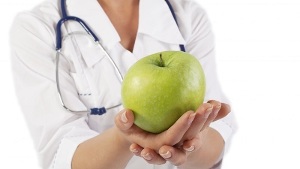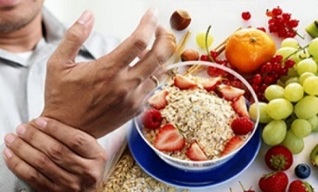Proper nutrition to treat the knee joint is the basis for effective treatment. Everyone interested in improving health should understand what kind of diet is needed for knee arthritis. Basic principles, permitted and prohibited foods, sample menus-the main issues that need further consideration.
Dietary requirements for arthritis

The main goal of the knee joint disease diet is to lose weight and get the right amount of nutrition. These nutrients have a positive effect on cartilage tissue and disease symptoms. Must pay attention to proper nutrition until the end of life.
General principles of joint diet:
- Need some nutrition. It is recommended to consume small amounts five times a day. Local nutrition can prevent overeating, so it can ensure weight loss.
- The maximum calorie per day is 3500 kcal. An active lifestyle and serious physical labor can increase this calorie content.
- I need dinner a few hours before bed.
- It is recommended to constantly monitor the weight.
- The diet includes healthy foods, which contain essential ingredients for the knee joint. Potentially unhealthy foods are excluded from the menu.
- The plate needs proper heat treatment. The benefits of food depend on this.
- Eliminate very hot and cold food. It is recommended to eat warm meals.
- Need to chew carefully and slowly. Following this rule will prevent overeating.
- It is recommended to drink half a liter a day. The focus is on clean water.
Develop a diet under medical supervision, just as a doctor considers the health of the patient when giving advice. Experts recommend that the menu include products that help get the nutrients you need. Physical support aims to prevent arthritis and eliminate symptoms related to the inflammatory process.
Essential nutrients
Knee joint disease requires minerals and vitamins, so this is important when planning meals.
.jpg)
Vitamin C is considered one of the most important. Vitamin C forms connective tissue and restores cartilage in the knee joint. Antioxidant properties can protect the cartilage tissue of the knee from free radical damage. The doctor pointed out that women need less vitamin C every day, and men need more. Vitamin C also helps to improve the immune system, so the body can fight knee inflammation on its own.
Boron promotes bone renewal. Boron and magnesium contribute to the complete absorption of calcium, which is necessary for knee joints. As a result, boron and magnesium and calcium are needed in the preparation of the diet. Not only need treatment, but also need prevention, so the three elements need to work together.
Pantothenic acid can improve the cell health of the knee joint. Useful ingredients are found in beef and pork liver, nuts, mushrooms, and green peas. The amount of this substance depends on the severity of symptoms.
Include omega-3 fatty acids in your diet. Substances eliminate pain syndrome, inflammation. In order to obtain a significant therapeutic effect, a continuous supply of fatty acids is required.
Prohibited products
Many people are interested in foods that are not suitable for knee joint arthritis. Some foods contain potentially dangerous substances. If food increases the risk of weight gain, it is recommended not to consume it.
The following foods are not included in the diet:
- Fatty meat products. These products can cause weight gain, damage the condition of knee joints, negatively affect sports activities and exacerbate symptoms.
- Vegetables: cabbage, green peppers, tomatoes. These vegetables contain ingredients harmful to the cartilage of the knee joint. For example, despite the presence of nutrients in fresh vegetables, the use of tomatoes for knee joints is minimized.
- Fruits and berries containing acid. These fruits will lead to the accumulation of mineral salts, which is dangerous to the joints.
- Flour products, sweets. These foods contain simple carbohydrates that may increase weight.
- Coffee. Excessive use of beverages can lead to a decrease in calcium salts in the body. This leads to joint problems. Calcium deposits help maintain healthy knee joints.
- Alcohol. Violation of the metabolic process. Nutrients are no longer absorbed.
- Semi-finished products, street fast food.
- Mayonnaise.
- Fat refined oil.
- Salt. The doctor recommends paying close attention to the salt content. Excessive salt intake can threaten salt deposition and damage the knee joint.
Because nicotine causes blood vessels to constrict, doctors also ban smoking. As a result, the metabolic process is disrupted. Smoking reduces the effectiveness of any treatment.
Fasting is prohibited during recovery. The body needs nutrition. The use of diuretics and laxatives is prohibited. This drug disrupts the metabolic process, leading to the loss of essential nutrients in the knee joint.
Useful products

The diet includes foods useful for knee arthritis. Healthy foods provide the nutrients needed to improve knee health.
- Low-fat poultry, meat, fish. The meat and fish dishes must be natural. Often eat broth-based soups, but still give preference to vegetables as the first course.
- Fermented milk products. The protein provided improves the cartilage of the knee joint. The maximum fat content of dairy products should be 3. 2%. The menu includes fermented milk products with high calcium content.
- Eggs. You can eat up to three eggs a day. A large number of eggs disrupt the metabolic process, so there is a risk of negatively affecting the knee joint.
- Natural aspic. This dish contains collagen and chondroitin, which are necessary to improve the condition of knee cartilage.
- Nuts. The intake of vitamin E can improve the metabolic process and stimulate the flow of beneficial ingredients into the knee joint.
- Cereals. The most useful are millet, rice, buckwheat, hard pasta. The standard time porridge will provide nutrients and complex carbohydrates to support the body.
- Fresh vegetables and fruits. These foods contain nutrients that support the body to fight knee inflammation.
- Or mineral water, herbs and green tea. The diet also includes freshly prepared fruit juices and vegetable juices, diluted with water beforehand. Healthy drinks help obtain vitamins and maintain the body's water balance.
The knee joint disease menu includes healthy foods to ensure the best nutritional intake.
Sample menu for a day with arthritis
If the menu is correct, the diet will be varied and nutritious.
Drink a glass of water before breakfast. The fluid improves metabolic processes and cleans the intestines.
Breakfast
Drink fruit or vegetable juice first. After 20 minutes, it is recommended to eat butter with butter. If needed, at breakfast, they plan to use natural honey to make cheesecakes, cereal biscuits, sandwiches with hard cheese, boiled eggs, and vegetable salads. After breakfast, drink green tea or herbal tea.
Lunch
Eat fresh or dried fruits for lunch. In order to improve joint health, nutrients must be taken in the diet.
Lunch
Plan to use vegetable or meat soup for lunch. Second, schnitzel, grilled ribs, grilled and boiled fish are ideal choices. It is recommended to pay attention to the presence of stews, mashed potatoes or baked potatoes, and grains. Rye bread will help ingest other substances designed to improve metabolic processes.
afternoon snack
As an afternoon snack, they ate fresh sweet fruits, a cup of dried fruit preserves and dried biscuits.
Dinner
Nutritionists recommend light meals to prevent weight gain. The recommended dishes are vegetable salad, cheese casserole with relaxing herbal tea.
When planning proper nutrition for knee arthritis, the focus is on the optimal calorie intake, that is, the intake of useful ingredients.























